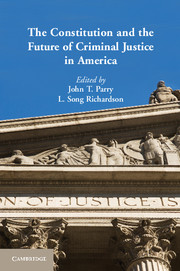Book contents
- Frontmatter
- Contents
- Contributors
- Acknowledgments
- Introduction
- Part I Foundations – The Scope of Criminal Law and Access to Counsel
- Part II Race and Criminal Procedure
- Part III Policing and Privacy
- Part IV Technology and the Surveillance Society
- Part V Confessions and miranda
- Part VI Conviction, Sentencing, and Incarceration
- Part VII Emergencies and Borders – Immigration, Terrorism, National Security, and Transnational Crime
- 14 Preemption and Proportionality in State and Local Crimmigration Law
- 15 Embattled Paradigms
- 16 The Civilianization of Military Jurisdiction
- 17 Crime across Borders
- Index
- References
16 - The Civilianization of Military Jurisdiction
Published online by Cambridge University Press: 05 June 2014
- Frontmatter
- Contents
- Contributors
- Acknowledgments
- Introduction
- Part I Foundations – The Scope of Criminal Law and Access to Counsel
- Part II Race and Criminal Procedure
- Part III Policing and Privacy
- Part IV Technology and the Surveillance Society
- Part V Confessions and miranda
- Part VI Conviction, Sentencing, and Incarceration
- Part VII Emergencies and Borders – Immigration, Terrorism, National Security, and Transnational Crime
- 14 Preemption and Proportionality in State and Local Crimmigration Law
- 15 Embattled Paradigms
- 16 The Civilianization of Military Jurisdiction
- 17 Crime across Borders
- Index
- References
Summary
Most discussions of current and future issues in American criminal law and procedure tend to ignore completely the role of the military in shaping that body of jurisprudence. Perhaps this lacuna reflects widespread – if tacit – acceptance of the maxim that “military law is to law as military music is to music.” Or it may represent generations of lawyers inculcated with Justice Black’s oft-quoted characterization of the U.S. court-martial system as a “rough form of justice.” Regardless, the assumption appears to be that there is little for true criminal law scholars to learn from judicial proceedings presided over by jurists – and juries – in uniform. As a particularly notorious case in point, when the Supreme Court in 2008 held that the Eighth Amendment forbids imposition of the death penalty for child rape (at least where the offense neither resulted nor intended to result in the death of the victim), its survey of the apparently vanishing number of U.S. jurisdictions authorizing such a punishment notoriously overlooked federal military law – which did so provide.
The Court’s unfortunate oversight in Kennedy v. Louisiana obfuscates the well-documented harmonization of U.S. military law with the procedural and substantive constitutional protections enjoyed by defendants in civilian criminal trials over the past three decades. Although the procedures deployed by courts-martial still differ in substantial ways from those one would find in a federal (or state) civilian court, U.S. military tribunals have, perhaps surprisingly, been active participants – if not trailblazers – in the articulation of constitutionally grounded principles of both criminal law and procedure.
- Type
- Chapter
- Information
- The Constitution and the Future of Criminal Justice in America , pp. 287 - 309Publisher: Cambridge University PressPrint publication year: 2013

